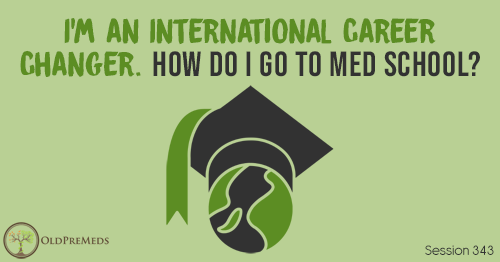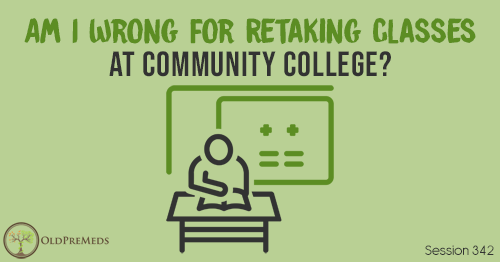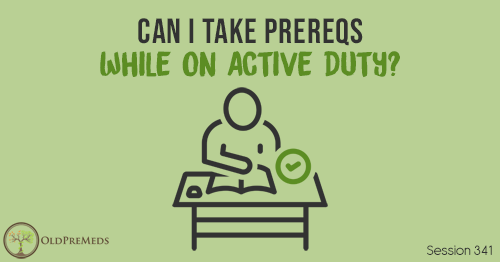Apple Podcasts | Google Podcasts
Session 73
Today on the OldPreMeds Podcast, our question is about whether an applicant’s medical history will affect their application to medical school, which is a common question I get. Do you need to mention your medical history in your personal statement? If so, how will it affect your application?
Listen to this podcast episode with the player above, or keep reading for the highlights and takeaway points.
[04:00] OldPreMeds Question of the Week:
“I am currently back in school working on completing my prereqs for medical school. I’m just wondering, is a medical history taken into account when applying to medical school, especially mental health?
I'm just wondering, is a medical history taken into account when applying to medical school, especially mental health?Click To TweetIn 2016, undiagnosed OCD led me to develop an eating disorder for which I’m currently recovering, as well as chronic depression. I’m wondering if these life events could affect my medical school application.
Aside from my mental health history, I am working towards a strong application (knock on wood). My undergrad GPA is 3.9. My current science and math GPA is 4.0. I’m about to begin volunteering at a hospital, and I work 24+ hours each week in an advanced-stage dementia nursing home, basically as a CNA. I serve as a peace corps volunteer, and I’m nearly fluent in Spanish.”
[05:00] Applying to Medical School with Health Issues
Luckily, for this student, their mental health has obviously not affected their grades. Ultimately, what the question comes down to is, what do I have to tell the medical schools about my medical history?
The plain answer is, you don’t have to tell them anything. There is nothing on the application that asks about your health.
There is nothing in the medical school application that asks about your health.Click To TweetOne way it could come up is if you had any significant gaps in education and you had to explain those. But even if you do have gaps in your education, you don’t have to explain those by saying you’ve had chronic depression, OCD, or an eating disorder. Instead, you can be very generic and say you’ve been dealing with some health issues that have gotten under control and, since coming back to school, you’ve been fantastic. And it shows!
[Related episode: Ignoring Advice, He Disclosed His Bipolar Disorder in Apps]
[06:34] Getting a Medical License with Health Issues
When you go for your medical license, you will be asked a question about any health issues that are going to prevent you from taking care of patients. It doesn’t sound like this poster has anything that would prevent them from taking care of patients, so this is not something to worry about.
However, this comes into play if you have a brain tumor and it’s affecting your cognition and your ability to think and control impulses. Then you’re starting to deal with some questionable issues.
If you have a vision problem or severe carpal tunnel and you’re a surgeon, then maybe that’s a problem. You’re going to have to disclose that on your applications for your medical license, as well as with the hospital.
[Related episode: Overcoming Disability and Biases]
[07:33] Don’t Disclose a Red Flag If You Don’t Need To
Whatever health condition you had is none of the medical school’s business. I highly recommend that even if this has motivated you to go into medicine, be very careful about talking about those things on your application and in your personal statement. This could pose a big red flag.
Medical schools are looking at thousands of applicants. Why would they take a chance on you when they could choose somebody else who is just as qualified but without any red flags?
Medical schools are looking at thousands of applicants. Why would they take a chance on you when they could choose somebody else who is just as qualified but without any red flags?Click To Tweet[Related episode: What Are Med School Red Flags and How Do I Talk About Them?]
Legally Blind Student Gets into Medical School
Back in Episode 194 of The Premed Years podcast, I talked to a premed student who is legally blind from a condition. The first time he applied, his personal statement was all about his blindness and how that motivates him. However, he didn’t get accepted anywhere, and he thought maybe he shouldn’t have done that.
The next time he applied, he didn’t mention anything about his blindness. He was able to hide it to a certain extent. If it was bright out, he was able to see well enough that he didn’t need a walking stick. Then he got accepted to medical school. The packages that came after his acceptance asked him about whether he needed accommodations, and that’s when he disclosed that he’s legally blind. Currently, he is in residency and is doing very well.
[09:46] So Should You Disclose Health Issues in Your Med School Application?
You may have struggled with mental health issues, but guess what? We are all dealing with something.
One of the reasons I’m doing podcasts full time now and I don’t practice medicine anymore is that I was diagnosed with MS. This was also one of the reasons I went into the Air Force instead of doing orthopedic surgery. I really wanted to pursue ortho, but it could have made my disease worse, which wasn’t worth it.
Hopefully, this discussion has helped you figure out whether your medical history is something that’s going to affect you. Usually, it doesn’t. For the most part, your business is not the medical school’s. Keep it to yourself and keep taking care of yourself on your journey. Hopefully, you will do very well.
For the most part, your business is not the medical school's.Click To TweetLinks and Other Resources
- Check out my Premed Playbook series of books (available on Amazon), with installments on the personal statement, the medical school interview, and the MCAT.
- Related episode: Should I Write About Red Flags in My Personal Statement?
- Related episode: Can You Become a Doctor If You’ve Been Arrested?
- Need MCAT Prep? Save on tutoring, classes, and full-length practice tests by using promo code “MSHQ” for 10% off Next Step full-length practice tests or “MSHQTOC” for $50 off MCAT tutoring or the Next Step MCAT Course at Blueprint MCAT (formerly Next Step Test Prep)!











